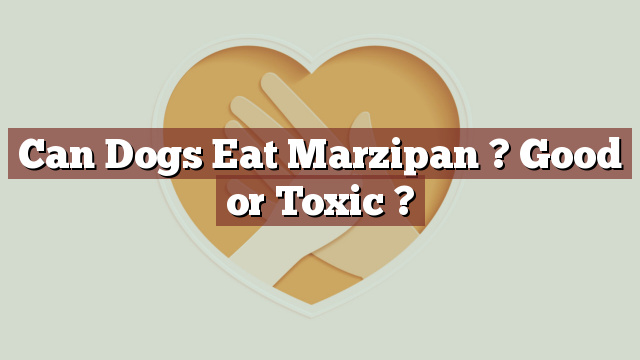Can Dogs Eat Marzipan? Good or Toxic?
As pet owners, it is important to be aware of what foods are safe for our furry friends to consume. One popular treat that often raises questions is marzipan. Can dogs eat marzipan? Is it safe for them or does it pose a risk to their health? In this article, we will explore the nutritional value of marzipan, discuss whether it is safe for dogs to consume, and highlight the potential risks and benefits associated with dogs eating marzipan.
Nutritional Value of Marzipan: What Does It Contain?
Marzipan is a sweet confection made primarily from ground almonds, sugar, and sometimes egg whites. It is often used in baking and is known for its smooth texture and sweet taste. While marzipan can be a delightful treat for humans, it is important to consider whether its nutritional composition is suitable for dogs.
Can Dogs Eat Marzipan Safely or is it Toxic?
Dogs should not eat marzipan as it is toxic to them. Almonds, which are the main ingredient in marzipan, can be harmful to dogs. Almonds contain a high amount of fat, which can lead to weight gain and potential digestive problems in dogs. Moreover, marzipan often contains added sugar, which is not recommended for dogs as it can contribute to obesity, dental issues, and even diabetes.
It is worth noting that some marzipan products may also contain other ingredients such as chocolate or artificial sweeteners like xylitol, both of which are highly toxic to dogs. Even small amounts of these substances can cause serious health problems and should be strictly avoided.
Potential Risks and Benefits of Dogs Consuming Marzipan
The risks associated with dogs consuming marzipan are significant. The high fat and sugar content can lead to weight gain, gastrointestinal upset, and other health issues. Ingesting even a small amount of chocolate or xylitol can be life-threatening for dogs, causing symptoms such as vomiting, diarrhea, seizures, and even organ failure.
On the other hand, there are no specific health benefits for dogs to consume marzipan. Dogs have different nutritional requirements than humans, and their diet should consist of foods that provide the necessary nutrients for their overall well-being.
What to Do If Your Dog Eats Marzipan: Steps to Follow
If your dog accidentally consumes marzipan, it is important to take immediate action. Contact your veterinarian or a veterinary emergency clinic to seek professional advice. Provide them with all the necessary information, including the quantity ingested and any additional ingredients present in the marzipan. The veterinarian will guide you on the next steps to ensure the safety and well-being of your dog.
Conclusion: Marzipan is Not Recommended for Dogs’ Consumption
In conclusion, dogs should not eat marzipan as it is toxic and can pose serious risks to their health. The high fat and sugar content, as well as potential inclusion of harmful ingredients like chocolate or xylitol, make marzipan unsuitable for canine consumption. It is essential to be aware of what foods are safe for our pets and to prioritize their health and well-being. If you have any doubts or concerns, it is always best to consult with a veterinarian who can provide professional advice tailored to your dog’s specific needs.
Thank you for investing your time in exploring [page_title] on Can-Eat.org. Our goal is to provide readers like you with thorough and reliable information about various dietary topics. Each article, including [page_title], stems from diligent research and a passion for understanding the nuances of our food choices. We believe that knowledge is a vital step towards making informed and healthy decisions. However, while "[page_title]" sheds light on its specific topic, it's crucial to remember that everyone's body reacts differently to foods and dietary changes. What might be beneficial for one person could have different effects on another. Before you consider integrating suggestions or insights from "[page_title]" into your diet, it's always wise to consult with a nutritionist or healthcare professional. Their specialized knowledge ensures that you're making choices best suited to your individual health needs. As you navigate [page_title], be mindful of potential allergies, intolerances, or unique dietary requirements you may have. No singular article can capture the vast diversity of human health, and individualized guidance is invaluable. The content provided in [page_title] serves as a general guide. It is not, by any means, a substitute for personalized medical or nutritional advice. Your health should always be the top priority, and professional guidance is the best path forward. In your journey towards a balanced and nutritious lifestyle, we hope that [page_title] serves as a helpful stepping stone. Remember, informed decisions lead to healthier outcomes. Thank you for trusting Can-Eat.org. Continue exploring, learning, and prioritizing your health. Cheers to a well-informed and healthier future!

